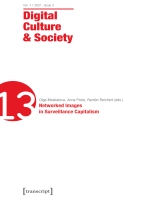Capturing personal data in exchange for free services is now ubiquitous in networked media and recently led to diagnoses of surveillance and platform capitalism. In social media discourse, dataveillance and data mining have been criticized as new forms of capitalist exploitation for some time.
From social photos, selfies and image communities on the internet to connected viewing and streaming, and video conferencing during the Corona pandemic – the digital image is not only predominantly networked but also accessed through platforms and structured by their economic imperatives, data acquisition techniques and algorithmic processing. In this issue, the contributors show how participation and commodification are closely linked to the production, circulation, consumption and operativity of images and visual communication, raising the question of the role networked images play for and within the proliferating surveillance capitalism.
عن المؤلف
Olga Moskatova is professor for media theory at University of Art and Design Offenbach am Main. Her fields of research include theory and aesthetics of visual media, materiality of media, networked images and media of immunization.
Anna Polze is pursuing her Ph D. at the Research Training Group ‘Documentary Practices’ at Ruhr-Universität Bochum.
Ramón Reichert (Dr. phil. habil.) teaches and researches as a senior researcher at the Department of Cultural Studies at the Universität für Angewandte Kunst in Vienna. Previously, he taught and researched in Basel, Berlin, Canberra, Fribourg, Helsinki, Sankt Gallen, Stockholm and Zurich and was EU project coordinator for many years. His current research project »Visual Politics and Protest. Artistic Research Project on the visual framing of the Russia-Ukraine War on internet portals and social media« (2022-2024) deals with the visual politics of violence, conflict and resistance.












